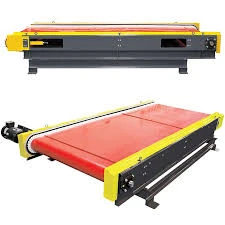

Aza . 26, 2024 21:28 Back to list
The Importance of Aluminium Recycling Plants
Aluminium is one of the most widely used metals in the world, owing to its lightweight, durability, and resistance to corrosion. Its versatile properties make it an essential material in various industries, including construction, automotive, aerospace, and packaging. However, the production of aluminium is energy-intensive and environmentally taxing. To mitigate these issues, aluminium recycling plants play a crucial role in ensuring a sustainable future.
The recycling process begins with the collection and sorting of aluminium scrap. This scrap can come from various sources, including used beverage cans, automobile parts, and construction materials. Once collected, the scrap is transported to recycling facilities, where it is sorted into different grades. Sorting is vital because it ensures that the recycling process is efficient and the recycled aluminium maintains a high-quality standard.
In a typical aluminium recycling plant, sorted aluminium is cleaned and prepared for melting. Contaminants such as plastic, paint, and other metals must be removed to protect the integrity of the recycled product. Once cleaned, the aluminium is fed into a furnace, where it is melted at high temperatures. This process uses only about 5% of the energy required to produce primary aluminium from bauxite ore. The significant energy savings associated with recycling not only reduces operational costs but also decreases greenhouse gas emissions.
After melting, the liquid aluminium is poured into molds to create ingots or other shapes. These ingots can then be sold to manufacturers for the production of new products. Aluminium can be recycled indefinitely without losing its properties, which is one of its most appealing characteristics. By using recycled aluminium, manufacturers can significantly reduce the need for primary production, leading to a decrease in mining activities and a lesser environmental footprint.

The role of aluminium recycling plants extends beyond the recycling process; they also contribute to job creation and local economies. Establishing a recycling facility can provide numerous employment opportunities, ranging from plant operators to engineers and environmental scientists. These jobs can help bolster local economies and promote community sustainability.
Moreover, recycling plants play a vital role in educating the public about the importance of recycling and sustainability. Many facilities offer tours and educational programs to raise awareness about the benefits of aluminium recycling. By engaging the community, these plants help foster a culture of recycling and reinforce the idea that individuals and businesses can contribute to environmental conservation efforts.
In recent years, the global demand for recycled aluminium has been on the rise. Companies are increasingly recognizing the economic and environmental advantages of using recycled materials. Many consumers are also becoming more conscious of their ecological footprint and are actively seeking products made from recycled materials. This shift in consumer behavior has prompted manufacturers to source more recycled aluminium, further driving investment into recycling plants.
Despite the advantages, challenges remain within the aluminium recycling industry. Fluctuating market prices for scrap aluminium can affect the profitability of recycling plants. Additionally, contamination and inadequate sorting can hinder the recycling process, leading to lower quality products. To overcome these challenges, the industry is continuously seeking innovations in technology and processes to improve efficiency and quality.
In conclusion, aluminium recycling plants are essential for promoting sustainability and reducing environmental impact. Through the efficient recycling of aluminium, these facilities not only save energy and resources but also contribute to local economies and community education. As the demand for recycled aluminium continues to grow, investments in recycling technology and infrastructure will be critical to ensuring the industry's future. By supporting aluminium recycling, we can all play a part in creating a more sustainable world for generations to come.
Latest news
Troubleshooting Common Eddy Separator Problems
NewsJul.04,2025
The Role of Metal Recycling Plants in Circular Economy
NewsJul.04,2025
The Impact of Recycling Line Pickers on Waste Management Costs
NewsJul.04,2025
Safety Features Every Metal Shredder Should Have
NewsJul.04,2025
How Industrial Shredders Improve Waste Management Systems
NewsJul.04,2025
How Cable Granulators Contribute to Sustainable Recycling
NewsJul.04,2025